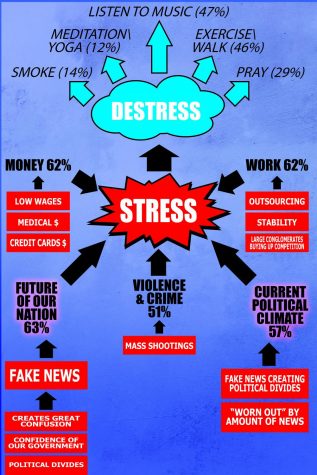Help write the headlines you want to read
Jul 15, 2019
News can be scary.
As journalists, we’ll always be the first to support the good in reporting the news: educating the public on important issues, holding leaders accountable and encouraging discourse. Reporting helps us be better citizens, better friends and helps us restore a bit of faith in humanity at times.
But especially over the past few years, we’ve seen this duty to share information with the public become a double-edged sword. While journalists have a duty to provide their audiences with the truth, we can never predict how our audience will receive it.
Now, the common reception to the steady stream of news is a gasp for air. Papers, both local and national, are filled with headlines citing political corruption, environmental failure and overall hopelessness for the country.
Americans want to be informed, with 95 percent of citizens following the news regularly. Of that lot, 62 percent feel “worn out” most of the time when consuming news. In that same Pew Research Center report, Millennials have the second highest percentage of participants who said they were “worn out” by the news overall.

With that in mind, it’s easy to feel stressed. As part-time journalists and part-time regular college students, we feel the same way at times, which is why we’re constantly faced with two choices: move along or take action.
Some students react the same way to stressful news as they do to a looming essay or project — they put in their headphones, turn up their music and try to ignore it for the time being. While some people work well under the pressure of a deadline overhead, it often multiplies stress and lowers the quality of the end result.
There are issues in the news that will not bend to your procrastination. Global warming will not put itself on hold at your leisure. Unmotivated politicians will not be kicked out of office if you lack the motivation to learn their platforms and vote accordingly. These issues will not fix themselves.
That’s why we need to take our news like medicine. While there’s a lot going on right now in our nation, the only way to free ourselves from the dreary view of news media is to start crossing things off the list.
Which headline would you rather read? One about incoming doom or one that boasts about our nation finally finding some much-needed solutions to our quarrels.
We know which ones we’d rather report on. It’s on you to make that happen.
If you’d like to get involved, there are on-campus resources. Contact the Office of Student Life to find an organization you can support at Grand Valley State University or learn about non-profit organizations in Grand Rapids.























